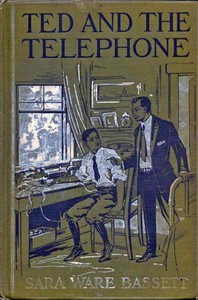Ted and the Telephone by Sara Ware Bassett (read the beginning after the end novel txt) 📗

- Author: Sara Ware Bassett
Book online «Ted and the Telephone by Sara Ware Bassett (read the beginning after the end novel txt) 📗». Author Sara Ware Bassett
"Didn't he ever meet any successful inventors?" questioned Ted.
"Yes, indeed," the tutor answered. "Scattered among the cranks and castle builders were several brilliant, solid-headed men. There was Moses G. Farmer, for example, one of the foremost electricians of that time, who had many an excellent and workable idea and who taught young Watson no end of valuable lessons. Then one day into the workshop came Alexander Graham Bell. In his hand he carried a mechanical contrivance Watson had previously made for him and on espying Tom in the distance he made a direct line for the workman's bench. After explaining that the device did not do the thing he was desirous it should, he told Watson that it was the receiver and transmitter of his Harmonic Telegraph."
"And that was the beginning of Mr. Watson's work with Mr. Bell?" asked Ted breathlessly.
"Yes, that was the real beginning."
"Think of working with a man like that!" the boy cried with sparkling eyes. "It must have been tremendously interesting."
"It was interesting," responded Mr. Hazen, "but nevertheless much of the time it must have been inexpressibly tedious work. A young man less patient and persistent than Watson would probably have tired of the task. Just why he did not lose his courage through the six years of struggle that followed I do not understand. For how was he to know but that this idea would eventually prove as hopeless and unprofitable as had so many others to which he had devoted his energy? Beyond Mr. Bell's own magnetic personality there was only slender foundation for his faith for in spite of the efforts of both men the harmonic telegraph failed to take form. Instead, like a tantalizing sprite, it danced before them, always beckoning, never materializing. In theory it was perfectly consistent but in practise it could not be coaxed into behaving as it logically should. Had it but been possible for those working on it to realize that beyond their temporary failure lay a success glorious past all belief, think what the knowledge would have meant. But to always be following the gleam and never overtaking it, ah, that might well have discouraged prophets of stouter heart!"
"Were these transmitters and receivers made from electromagnets and strips of flat steel, as you told us the other day?" asked Ted.
"Yes, their essential parts comprised just those elements—an electromagnet and a scrap of flattened clock spring which, as I have explained, was clamped by one end to the pole of the magnet and left free at the other to vibrate over the opposite pole. In addition the transmitter had make-and-break points such as an ordinary telephone bell has, and when these came in contact with the current, the springs inside continually gave out a sort of wail keyed to correspond with the pitch of the spring. As Mr. Bell had six of these instruments tuned to as many different pitches—and six receivers to answer them—you may picture to yourself the hideousness of the sounds amid which the experimenters labored."
"I suppose when each transmitter sent out its particular whine its own similarly tuned receiver spring would wriggle in response," Laurie said.
"Exactly so."
"There must have been lovely music when all six of them began to sing!" laughed Ted.
"Mr. Watson wrote once that it was as if all the miseries of the world were concentrated in that workroom, and I can imagine it being true," answered the tutor. "Well, young Watson certainly did all he could to make the harmonic telegraph a reality. He made the receivers and transmitters exactly as Mr. Bell requested; but on testing them out, great was the surprise of the inventor to find that his idea, so feasible in theory, refused to work. Nevertheless, his faith was not shaken. He insisted on trying to discover the flaw in his logic and correct it, and as Watson had now completed some work that he had been doing for Moses Farmer, the two began a series of experiments that lasted all winter."
"Jove!" ejaculated Laurie.
"Marvels of science are not born in a moment," answered Mr. Hazen. "Yet I do not wonder that you gasp, for think of what it must have meant to toil for weeks and months at those wailing instruments! It is a miracle the men did not go mad. They were not always able to work together for Mr. Bell had his living to earn and therefore was compelled to devote a good measure of his time to his college classes and his deaf pupils. In consequence, he did a portion of his experimental work at Salem while Watson carried on his at the shop, fitting it in with other odd jobs that came his way. Frequently Mr. Bell remained in Boston in the evening and the two worked at the Williams's shop until late into the night."
"Wasn't it lucky there were no labor unions in those days?" put in Ted mischievously.
"Indeed it was!" responded Mr. Hazen. "The shop would then have been barred and bolted at five o'clock, I suppose, and Alexander Graham Bell might have had a million bright ideas for all the good they would have done him. But at that golden period of our history, if an ambitious fellow like Watson wished to put in extra hours of work, the more slothful ones had no authority to stand over him with a club and say he shouldn't. Therefore the young apprentice toiled on with Mr. Bell, unmolested; and Charles Williams, the proprietor of the shop, was perfectly willing he should. One evening, when the two were alone, Mr. Bell remarked, 'If I could make a current of electricity vary in intensity precisely as the air varies in density during the production of sound, I should be able to transmit speech telegraphically.' This was his first allusion to the telephone but that the idea of such an instrument had been for some time in his mind was evident by the fact that he sketched in for Watson the kind of apparatus he thought necessary for such a device and they speculated concerning its construction. The project never went any farther, however, because Mr. Thomas Saunders and Mr. Gardiner Hubbard, who were financing Mr. Bell's experiments, felt the chances of this contrivance working satisfactorily were too uncertain. Already much time and money had been spent on the harmonic telegraph and they argued this scheme should be completed before a new venture was tried."
"I suppose that point of view was quite justifiable," mused Ted. "But wasn't it a pity?"
"Yes, it was," agreed Mr. Hazen. "Yet here again we realize how man moves inch by inch, never knowing what is just around the turn of the road. He can only go it blindly and do the best he knows at the time. Naturally neither Mr. Hubbard nor Mr. Saunders wanted to swamp any more money until they had received results for what they had spent already; and those results, alas, were not forthcoming. Over and over again poor Watson blamed himself lest some imperceptible defect in his part of the work was responsible for Mr. Bell's lack of success. The spring of 1875 came and still no light glimmered on the horizon. The harmonic telegraph seemed as far away from completion as ever. Patiently the men plodded on. Then on a June day, a day that began even less auspiciously than had other days, the heavens suddenly opened and Alexander Graham Bell had his vision!"
"What was it?"
"Tell us about it!" cried both boys in a breath.
"It was a warm, close afternoon in the loft over the Williams's shop and the transmitters and receivers were whining there more dolefully than usual. Several of them, sensitive to the weather, were out of tune, and as Mr. Bell had trained his ear to sounds until it was abnormally acute, he was tuning the springs of the receivers to the pitch of the transmitters, a service he always preferred to perform himself. To do this he placed the receiver against his ear and called to Watson, who was in the adjoining room, to start the current through the electromagnet of the corresponding transmitter. When this was done, Mr. Bell was able to turn a screw and adjust the instrument to the pitch desired. Watson admits in a book he has himself written that he was out of spirits that day and feeling irritable and impatient. The whiners had got on his nerves, I fancy. One of the springs that he was trying to start appeared to stick and in order to force it to vibrate he gave it a quick snap with his finger. Still it would not go and he snapped it sharply several times. Immediately there was a cry from Mr. Bell who rushed into the hall, exclaiming, 'What did you do then? Don't change anything. Let me see.'
"Watson was alarmed. Had he knocked out the entire circuit or what had he done in his fit of temper? Well, there was no escape from confession now; no pretending he had not vented his nervousness on the mechanism before him. With honesty he told the truth and even illustrated his hasty action. The thing was simple enough. In some way the make-and-break points of the transmitter spring had become welded together so that even when Watson snapped the instrument the circuit had remained unbroken, while by means of the piece of magnetized steel vibrating over the pole of the magnet an electric current was generated, the type of current that did exactly what Mr. Bell had dreamed of a current doing—a current of electricity that varied in intensity precisely as the air within the radius of that particular spring was varying in density. And not only did that undulatory current pass through the wire to the receiver Mr. Bell was holding, but as good luck would have it the mechanism was such that it transformed that current back into a faint but unmistakable echo of the sound issuing from the vibrating spring that generated it. But a fact more fortunate than all this was that the one man to whom the incident carried significance had the instrument at his ear at that particular moment. That was pure chance—a Heaven-sent, miraculous coincidence! But that Mr. Bell recognized the value and importance of that whispered echo that reached him over the wire and knew, when he heard it, that it was the embodiment of the idea that had been haunting him—that was not chance; it was genius!"
The room had been tensely still and now both boys drew a sigh of relief.
"How strange!" murmured Ted in an awed tone.
"Yes, it was like magic, was it not?" replied the tutor. "For the speaking telephone was born at that moment. Whatever practical work was necessary to make the invention perfect (and there were many, many details to be solved) was





Comments (0)